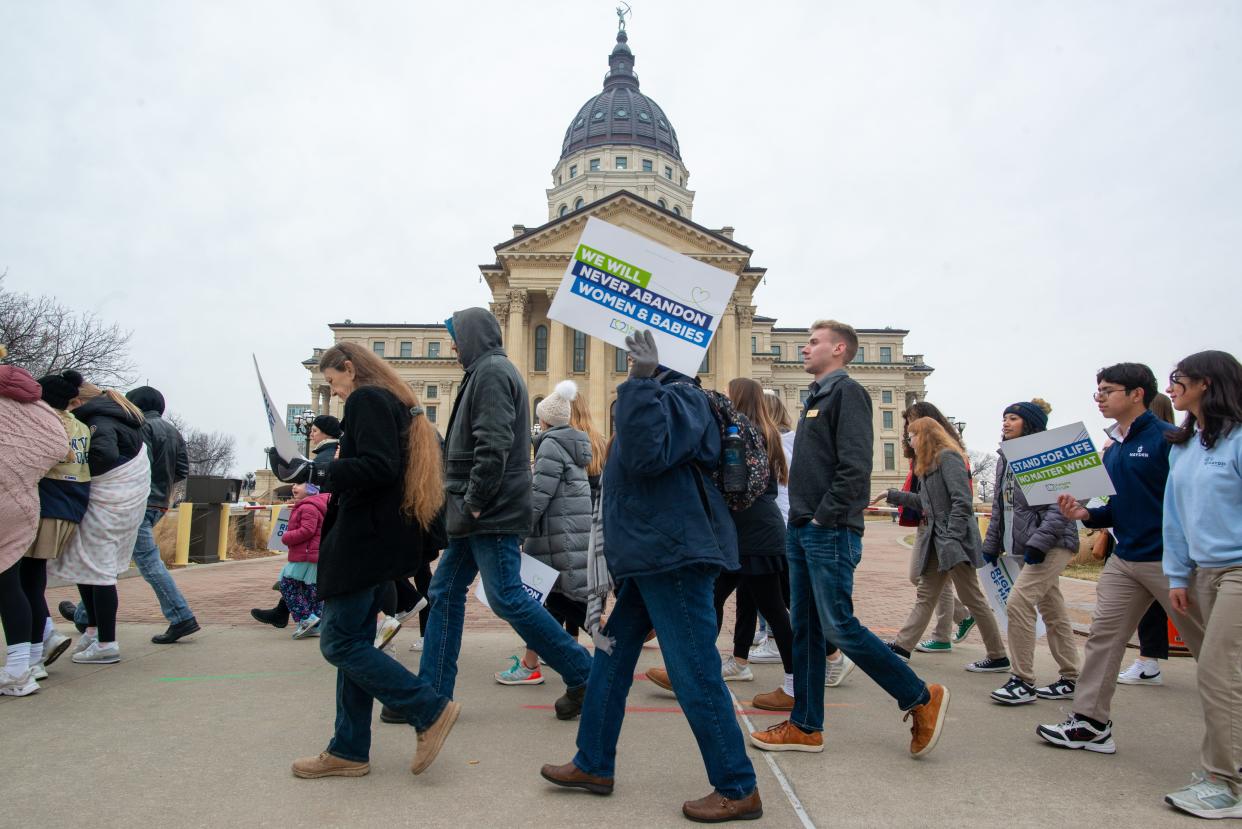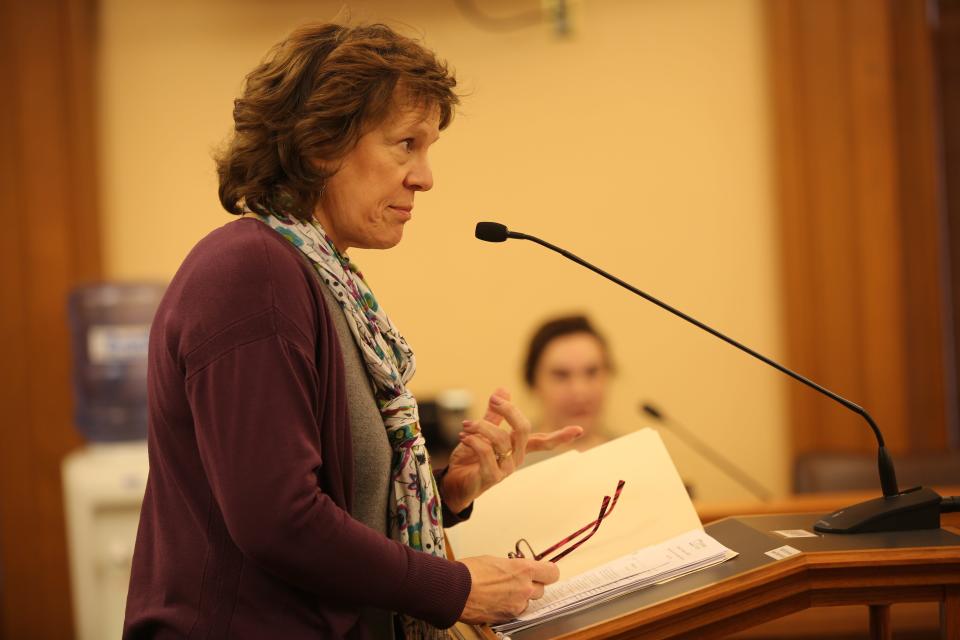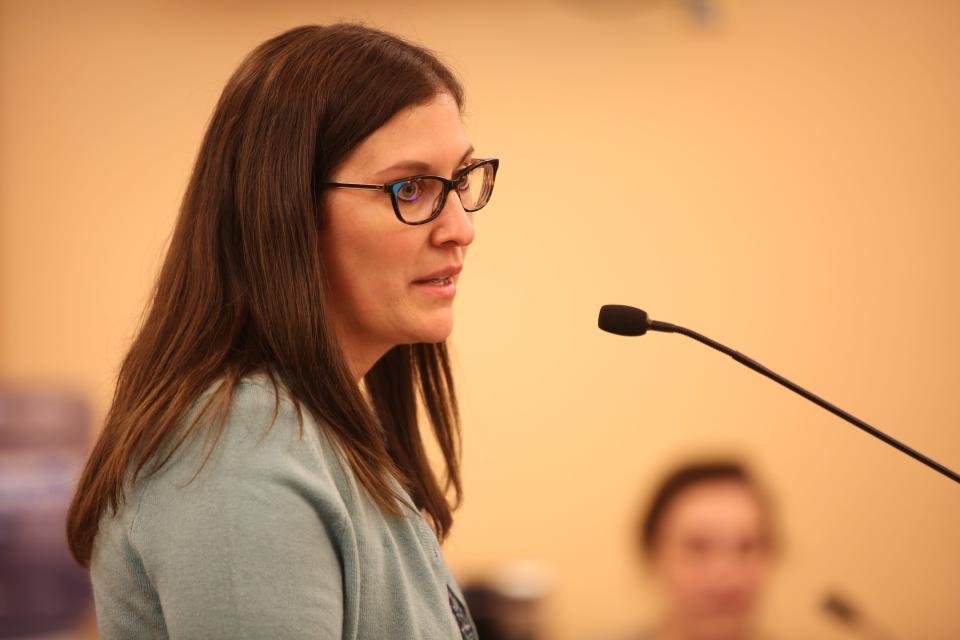Taxpayer funding would boost anti-abortion counseling and ads under Kansans for Life plan

The state's foremost anti-abortion lobbying group is asking Kansas lawmakers to create a program where taxpayer money would help fund anti-abortion efforts.
Kansans for Life is backing HB 2429, which would create an "alternatives to abortion program" and a related promotional program under the Kansas Department for Children and Families. The legislation is explicitly designed to "promote childbirth instead of abortion."
"KFL and its statewide membership strongly supports life-affirming options to abortion," said Jeanne Gawdun, a Kansans for Life lobbyist.
The House Health and Human Services Committee heard testimony on the bill on Tuesday. Rep. Brenda Landwehr, R-Wichita and the committee chair, introduced it. The hearing came a day after supporters of abortion rights and LGBT rights held a day of advocacy at the capitol.
Kansans for Life had announced the the proposal as part of its agenda during the group's March and Rally for Life at the Statehouse in January, an event where some anti-abortion activists said the movement should put more focus on helping mothers after they give birth. The bill joins a slew of anti-abortion legislation this session.
While supporters of anti-abortion counseling centers point to the services they provide to pregnant people before and after a child is born, opponents like Katie Baylie, of Planned Parenthood Great Plains Votes, argue that they "knowingly spread false, misleading information and provide no legitimate medical services."
"PRCs exist thanks to private donations from people who support their life-affirming work," Gawdun said, "and they provide largely social services to women and their families and are upfront about the fact that they do not perform nor refer for abortion. While not all pregnancy resource centers provide medical services, many do, and those services are performed by licensed medical professionals who are bound by medical and ethical directives."
A majority of Republican legislators have already shown a willingness to proceed with anti-abortion legislation, despite the Aug. 2 election where voters overwhelmingly rejected the proposed Value Them Both amendment, which would have allowed the Legislature to enact tighter restrictions on abortion or even a ban.
More:Shrugging off August 2022 abortion vote, Kansas Senate passes two anti-abortion bills
But Democratic Gov. Laura Kelly is almost surely to veto any standalone anti-abortion bill, and slim margins on other bills this session suggest Republicans will have a difficult time overriding vetoes on anti-abortion legislation.
Kelly has previously indicated her approach would be to request a commensurate amount of state support for both sides of the issue, which is likely a nonstarter for Republicans since the bill bans any money in the program from helping people get abortions or going to organizations affiliated with helping people get abortions.
Kansans for Life wants to boost funding for anti-abortion efforts

Anti-abortion counseling centers, which supporters refer to as crisis pregnancy centers or pregnancy resource centers, have become more of a political battleground this session. Kansans for Life has two plans to boost funding for the facilities.
A separate proposal, which has already passed the Senate, would provide up to $10 million in income tax credits to incentivize private donations — an idea that is more palatable to organization leaders who are wary of the strings attached to government dollars.
More:Kansas bill advances allowing tax break for donations to anti-abortion pregnancy centers
The second proposal creates two programs — the "alternatives to abortion program" and the "alternatives to abortion public awareness program" — design to spend taxpayer money directly on supporting anti-abortion centers.
The first program would be required to offer services that include "pregnancy support centers, adoption assistance and maternity homes."
Kansas has about 50 such counseling centers plus maternity homes and adoption agencies, Gawdun said.
"I remember as a child going to the local PRC with my mother to donate diapers," said Lucretia Nold, of the Kansas Catholic Conference. "And even most recently, when I was back visiting my parents, my mother came up to me excited to show me some new fabric she had purchased to make a baby blanket."
While some facilities provide more material assistance, others have parenting classes and other resources, she said.
Additional services under the bill could include counseling, coordinating prenatal care, education, referrals to non-abortion services and providing material support, such as diapers, formula, cribs, car seats and maternity clothes.
The program's services would be available to any Kansas resident who is a pregnant woman, the parent or legal guardian of a pregnant girl, the biological father before birth, a biological or adoptive parent for the first two years after birth and someone "who has experienced the loss of a child." The bill does not define what loss of a child encompasses.
While the state funding could only be used on Kansas residents within the parameters laid out in the bill, the organizations would still be allowed to offer other services — such as to out-of-state people — through other funding sources.
Kansas taxpayer money could pay for anti-abortion ads
The bill's second "alternatives to abortion public awareness program" would be to "help pregnant women who are at risk of having abortions to be made aware" of the services available through the other program.
The public awareness program would create a website listing of services and promote it through advertising on television, radio, the internet and elsewhere.
Billboards along I-70 and I-35 have been contemplated as a way to divert out-of-state people seeking abortions in Kansas away from an abortion clinic and to an anti-abortion center.
"The public awareness program component of the bill is greatly needed as it will spread word about PRCs and the services they offer to women in need," Gawdun said.
Kansas bill doesn't mandate oversight of programs or public reports
While the programs would be administered by DCF, it would be privatized — and not through DCF, which is part of Democratic Gov. Laura Kelly's administration.
Instead, Republican state Treasurer Steven Johnson would be required to contract out both programs to one nonprofit organization that then subcontracts with existing pregnancy centers, adoption agencies, maternity homes and social service organizations.
The bill states that the providers get to determine services, not DCF, and DCF is not granted any regulatory authority to further define the services listed in the bill.
There would seemingly be little to no oversight of the program operations. The bill does not mandate any public reports to DCF, the treasurer or the Legislature, and the privatization of services would shield much of the work from open records law.
Baylie, of Planned Parenthood, pointed to a lack of oversight for the new program, as opposed to the Pregnancy Maintenance Initiative. It includes various requirements, including an annual report on program outcomes from KDHE to the Legislature.
"The proposed legislation does not set forth minimum standards or oversight for the recipient organizations toensure public funds are being appropriately utilized," she said.
Baylie warned that a lack of oversight could lead to mismanagement, referring to stories from Texas, North Carolina and Pennsylvania.
"Instead of this money going to essential needs, the money, at best, would be used to coerce and mislead individuals and contribute to increased inequalities," Baylie said. "At worst, as evidenced in other states, this money will be used to fund executive salaries, trips, and out-of-state development costs, with little to no governmental oversight."
How much money would go to anti-abortion efforts?
The bill establishes a legal framework for the program but does not include a dollar amount, though Kansans for Life officials have previously indicated they would like it to be about $8 million a year.
"As of now, the bill does not include a state appropriation, so that is something that of course will be need to be done" by the Legislature, Gawdun said.
The bill includes a provision requiring DCF to seek additional money for the program from other funding sources "to the greatest extent possible." The agency said the provision could affect Temporary Assistance for Needy Families funding.
Such has been the case in Texas, which from 2006 to 2021 funneled $45 million in federal TANF funds to anti-abortion counseling centers, according to NBC News.
Proposal builds on existing program
Kansas already has some taxpayer funding for anti-abortion efforts through the Stan Clark Pregnancy Maintenance Initiative, which is administered by the Kansas Department of Health and Environment. Last fiscal year, the program granted about $339,000 to 10 organizations that provided 834 participants — an average of $406 per person — with services similar to those in HB 2429.
Based on past abortion statistics, DCF predicted about 4,400 abortion in 2024, which at $406 in services per person would be about $1.8 million in expenses. That estimate does not include biological fathers of an unborn child or parents of a child up to two years after birth, which the agency said it could not estimate.
Supporters of anti-abortion centers applaud the program, but say more services could be provided under the new proposal.
Embrace of Wichita executive director Tim Quiggle said his organization gets one grant from the Pregnancy Maintenance Initiative for $44,000, or 6% of the organization's $780,000 annual budget. The vast majority of its operations are funded through individual donors, plus donations from churches, businesses and matching gifts.
He estimated that the free services provided by Embrace — which includes pregnancy testing, sonograms and STD testing, among others — would be valued at $277,000. The KDHE licenses the facility, which also has an in-house laboratory and pharmacy.
Quiggle said he would use state funding to expand services to Derby.
Heather Roberts, of Catholic Charities of Northeast Kansas, said it would use more money to hire more staff at its Wyandotte County facility, including a full-time bilingual social worker, while also looking to expand to Topeka and Lawrence.

"We know that people are having babies, and lots of people need support to kind of get to medical services, get support through the term of the baby," she said. "We also would love to be able to serve a baby much longer."
Roberts said the organization currently receives about $40,000 a year from the Pregnancy Maintenance Initiative, but she did not know how much more funding they would need to expand services.
"I had hoped that you would come prepared," said Rep. Susan Ruiz, D-Shawnee, who had pressed Roberts on how additional money would be used.
This article originally appeared on Topeka Capital-Journal: Kansans for Life pushes taxpayer funding of anti-abortion centers

